| Review: Digital
Anarchy's ToonIt 1.02 |
December, 2007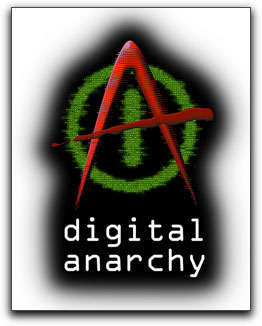
Digital
Anarchy's ToonIt 1.02

For Adobe After Effects and Final Cut Pro
http://www.digitalanarchy.com
- $295.00
Review by Steve
Douglas
I
have been a fan of the Digital Anarchy plugins for Final Cut
Pro and After Effects ever since I discovered their Psunami plugin
several years ago. I always appreciated the quality and flexibility
of any of their software sets. ToonIt is compatible for Mac OSX
or higher or Windows, and is compatible with AE 5.5 or higher
or FCP 5.1.4 and Motion 2.1.2 or higher. ToonIt is both Universal
and FxPlug compatible as well as compatible for Apple's new Leopard
OS.
You have surely seen the many commercials
on television and in film where the actors have been transformed
to cartoon versions of themselves. It is not a hard process to
create but it can be time consuming, and time is money. Digital
Anarchy has recently introduced their latest plugin package,
ToonIt, which simplifies the task enabling you to create and
customize your own cartoon looks from your original footage.
Plus, it does it better.
ToonIt is comprised of four individual
plug-ins, Roto Toon, Outlines Only, Goth and Blacklight Edges.
The Outlines Only filter disregards all color in your footage
and reduces the edges in each frame to a basic black or colored
edge onto a white background.

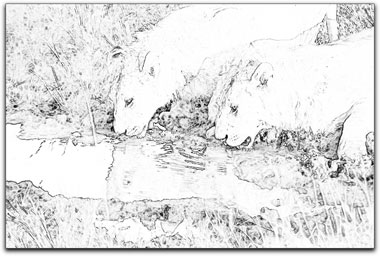
While I've seen and
used outlines filters before, this one from the ToonIt collection,
seems to be the most effective.
It's edge detector creates a beautiful and artistic rendering
of the photo used here. Photo by Jan Hemme
The Goth Filter condenses your image to 3 colors, dark, midtone
and light. There are actually 2 Goth presets, which you can then
further customize with the many parameter controls so that you
determine just how much, or how little, your image is altered.


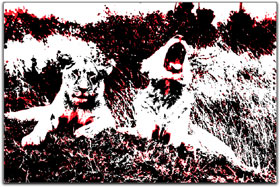
There are two separate
presets within the Goth Filter which flattens out the entire
image into 3 basic colors.
You have complete control over the filter's algorithm to decide
how much color should be applied. Photo by Jan Hemme
For those old enough to remember Woodstock and the old blacklight
hippie days, the Blacklight Edges filter should bring back some
fine memories. It is similar to the Outlines Only filter except
that it maps a color gradient to the edge detection algorithm
enabling your image to almost literally pop out of the picture.
As the name of the filter implies, it is as if you were seeing
the edges under a blacklight.

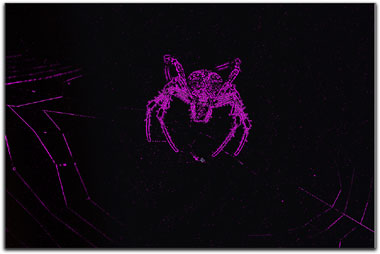
Using the default
settings, application of the Blacklight filter needed no adjustments.
Photo by Randy Siegel
The filter you will most often use, and the main reason for buying
Digital Anarchy's ToonIt set of plug-ins is the Roto Toon filter.
It is an excellent filter capable of a wide range of cartoon
looks. The Roto Toon effect works by flattening the colors at
the same time as it supplies the editor with numerous controls
over the amount of edge detail, outlines and color tones. The
Roto Toon filter's rotoscoping and edge detection capabilities
composite together to create complete cartoon effects within
a diversity of ranges.


I was able to keep
in much of the background detail while using the Roto Toon filter
on this video frame.

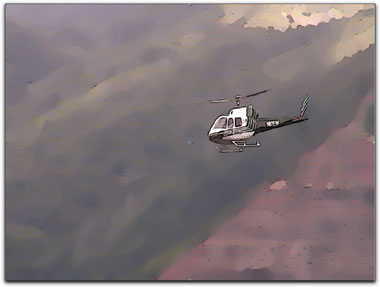
I wanted to keep
the focus on the helicopter and found it easy to flatten the
colors a bit more and add blur to the background.
Working in Adobe After Effects CS 3, I found ToonIt fairly intuitive
to use, and easy to adjust blurring, half tones and edge detail.
Installation of ToonIt was simple. For
After Effects you select AE's plugins folder and the install
is almost immediate. For Final Cut Pro and Motion, you select
the hard drive and it installs itself into your FX plug-ins folder.
I had no problems with either installation. In After Effects,
working on a 3GHz Dual-Core Mac Pro, 5.5 gigs ram, ToonIt worked
great. Adjustments made to parameters resulted in almost instant
results when using video clips. When applied to still images,
there was a bit of a delay. Like Digital Anarchy's Psunami, while
they say it is for both After Effects and Final Cut Pro, it is
truly best to limit your use to After Effects. I found that ToonIt
in Final Cut Pro too often brought up the spinning beach ball,
which can really cut into your time. Once it disappeared, any
adjustments to any of the filter's parameters just brought it
up again. It never caused a crash; you just have to wait for
the beachball to go away. This never occurred in After Effects.
This is not really a fault of Digital Anarchy's, rather it is
due to the way Apple handles Fx Plug-ins and the way Final Cut
Pro handles the canvas video display. While, for the purpose
of this review, I did not actually render out any of the filter
applications, you can expect a longer than usual render time.
According to the folks at Digital Anarchy, you can speed up the
renders in Final Cut Pro by applying a deinterlace filter prior
to applying any of the ToonIt filters. This avoids FCP from having
to render each interlaced frame twice over for each frame and
should cut your render times in half. Never the less, when I
use ToonIt, I will choose to use it in After Effects where any
changes to my images were smoothly created.
Thus, my bottom line for ToonIt is that,
when used in After Effects, it is a real time saver for anyone
who wishes to recreate much of the cartoon like effects that
seem so ubiquitous as of late. ToonIt was very stable, and came
with an easy to understand downloadable manual. Applause should
also go to the folk at Digital Anarchy who, over the years, have
kept downloadable video tutorials on their website which can
go a long way towards clarifying things for someone just getting
acquainted with any of their plugin packages. As are all of the
Digital Anarchy plugin sets, I urge you to try a free demo of
ToonIt available for download on their website. The demo will
be watermarked but I think you will be impressed with their quality,
which makes them certainly worth your hard earned cash. While
I might not have a great need for each of the plugins, the real
gem of this package is the Roto Toon filter for which I will
be able to find a multitude of uses.
 Steve
Douglas is a certified Apple Pro for Final Cut Pro 6 and
underwater videographer. A winner of the 1999 Pacific Coast Underwater
Film Competition, 2003 IVIE competition, 2004 Los Angeles Underwater
Photographic competition, and the prestigious 2005 International
Beneath the Sea Film Competition, where he also won the Stan
Waterman Award for Excellence in Underwater Videography and 'Diver
of the Year', Steve was a safety diver on the feature film "The
Deep Blue Sea", contributed footage to the Seaworld Park's
Atlantis production, the History channel's MegaDisaster show
and other networks. Steve is one of the founding organizers of
the San Diego UnderSea Film Exhibition and leads both underwater
filming expeditions and African safaris with upcoming excursions
to Indonesia and the Coco Islands, Costa Rica in 2008, Kenyan
safari in Africa and the Red Sea for 2009, and Truk Lagoon in
Micronesia for 2010. Feel free to contact him if you are interested
in joining Steve on any of these exciting trips. www.worldfilmsandtravel.com
Steve
Douglas is a certified Apple Pro for Final Cut Pro 6 and
underwater videographer. A winner of the 1999 Pacific Coast Underwater
Film Competition, 2003 IVIE competition, 2004 Los Angeles Underwater
Photographic competition, and the prestigious 2005 International
Beneath the Sea Film Competition, where he also won the Stan
Waterman Award for Excellence in Underwater Videography and 'Diver
of the Year', Steve was a safety diver on the feature film "The
Deep Blue Sea", contributed footage to the Seaworld Park's
Atlantis production, the History channel's MegaDisaster show
and other networks. Steve is one of the founding organizers of
the San Diego UnderSea Film Exhibition and leads both underwater
filming expeditions and African safaris with upcoming excursions
to Indonesia and the Coco Islands, Costa Rica in 2008, Kenyan
safari in Africa and the Red Sea for 2009, and Truk Lagoon in
Micronesia for 2010. Feel free to contact him if you are interested
in joining Steve on any of these exciting trips. www.worldfilmsandtravel.com
copyright © Steve
Douglas 2007
This article first appeared on
www.kenstone.net and is reprinted here with permission.
All screen captures and textual references are the property and
trademark of their creators/owners/publishers.